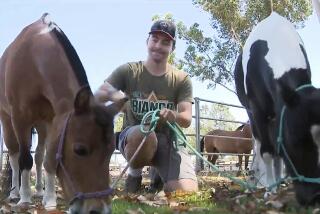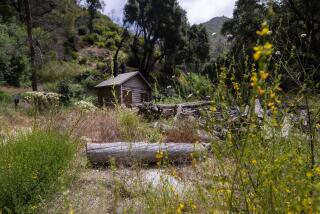Making a Stink Over a Stable
It’s a modern, urban version of the Old West’s showdown at the OK Corral.
This time, though, the fight is over whether the corral is OK.
The horse enclosure is tucked in a ravine behind a cul-de-sac of multimillion-dollar homes in Woodland Hills.
But it is drawing fire from state parks administrators who contend it has been illegally built on parkland. And residents are complaining about something more basic: the smell.
“The stench is horrible and there is a problem with flies. We used to barbecue in the backyard and play croquet. Now it makes us vomit to go out in the backyard,” said Loan Brooks, who lives within eyeshot of the corral.
Added her neighbor, Karen Brown: “Come back at 5 o’clock at night and bring your gas mask.
“Since October it’s smelled like we live in a pigsty. That used to be a beautiful meadow out there.”
Horse ranch operator Michele Testa argues the stable should be allowed to stay on a narrow sliver of Topanga State Park property because it is sheltering animals that have been rescued from slaughterhouses and are being rehabilitated so they can be ridden along parkland trails in the Santa Monica Mountains.
The controversial corral is encircled by a solar-powered electric fence and covers about a 50-by-150-foot area south of Howard Court, a short street that is nestled in the foothills that line the south side of the San Fernando Valley.
Testa, 46, said the corral is an integral part of what she calls Dude’s Ranch, which she said has saved dozens of abused or endangered horses over the last eight years.
She moved to the three-acre ranch in September from leased horse property in Tarzana. She said she was unaware when she built the corral that she was trespassing on state property -- and so were parks officials.
“There are no parks boundary markers. They didn’t even know it was back here until I came and put the corral there,” she said of the parcel of Topanga State Park. “The park ranger that came out here didn’t even know they had property there.”
Parks officials dispute that. They say they obtained the acreage about three years ago after the Santa Monica Mountains Conservancy purchased it and deeded it to the state parks system.
“We’re aware of everything we own,” said Ron Schafer, Angeles district superintendent for the California Department of Parks and Recreation. “The problem is we don’t have enough rangers to patrol our property. We find out that things like this happen and we have to take action later.”
Schafer said parks authorities learned of the stable after neighbors complained to Los Angeles city and county officials. He issued a cease-and-desist order in late January, ordering Testa to remove the unauthorized corral and then obtain a state permit to restore the site to its original, brushy condition.
So far, she has resisted. “There’s a need for us in this community,” said Testa, who hopes to persuade officials to lease her the corral space since the trail rides her ranch offers complement the parks agency’s goal of getting the public to visit state-owned wilderness areas.
That’s not likely to happen, according to Schafer.
“If she wants to rent public land for a business, I’m not inclined to do that. We do have concessions on park property, but when we buy land, it’s for the public, not for private business,” he said.
“Another issue that hasn’t been addressed is if somebody has a business and state parks land is critical to making that business go, we would want a percentage of that business’ profit. It’s a concession, even though money is being exchanged off-site.”
Schafer said the ranch’s business model differentiates it from another animal rescue service that is allowed to operate on state parkland. The nonprofit California Wildlife Center in Calabasas treats injured animals such as coyotes, bobcats and deer and releases them back into the mountains.
Testa said she rents the ranch, which was built in 1952, for $5,000 a month. She said she had intended to eventually purchase the property, which is zoned for horses.
Wild or neglected horses and broken-down former racehorses who have been rescued must be carefully trained before they can be offered for adoption, sold or used for mountain trail rides, Testa said.
Riding lessons and rides are offered by ranch workers and volunteers at a rate of $50 per hour. Proceeds are used to support the horse rescue program, she said.
The Dude’s Ranch Equine Rescue Center is named after one of the first horses she rescued, Testa said. The 28-year-old Appaloosa named Dude had been abused. “He was mean. He kicked and bit everybody. It took a long time to get him social,” Testa said. He is among 26 horses currently kept at the ranch.
The neighbors’ complaints about odors are overstated, she said. But other ranch operations irritate them too.
“It’s a horsy smell. It’s not overwhelming,” Testa said. “They almost had a lynch mob at 9 o’clock one night. They blocked my driveway and screamed at a woman dropping off a horse.”
Brown has lived on the street for 18 years. She said the residential neighborhood is not a proper place for a horse-riding business.
“That is parkland out there. Can anyone walk into Topanga State Park and set up a business? There are many places these horses can go without infringing on state parkland or on a residential neighborhood.”
More to Read
Sign up for Essential California
The most important California stories and recommendations in your inbox every morning.
You may occasionally receive promotional content from the Los Angeles Times.











